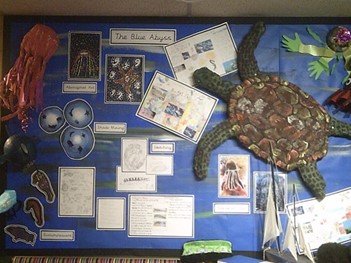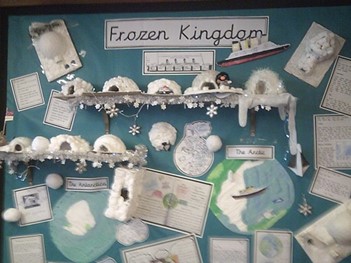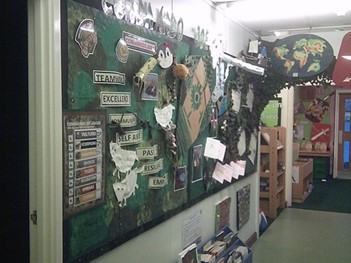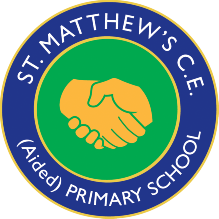
“I just wish the world was twice as big and half of it was still unexplored.” ― David Attenborough
Our Vision at St Matthews
At St Matthews, our vision is to inspire children's curiosity about the world around them through the teaching and exploration of science. To encourage critical thinkers, to learn skills where children can acquire the understanding of scientific methods and explorations.
Intent
At St Matthew’s Primary school, our school vision is to encourage all children to flourish spiritually, morally, emotionally, physically and intellectually in all aspects of life demonstrating perseverance and
resilience; this is emulated across all curriculum areas.
We strongly believe that science is fundamental, itis an extension of their everyday world. Science helps children develop essential life skills, including an ability to communicate, remain organised and focussed and even form their own opinions based on observation.
• Children are naturally curious. Our science education fuels their curiosity and provides children with valuable ideas, skills and potential career choices.
• We believe that scientists are an important part of our future world, we would not be able to predict earthquakes, the weather, understand global warming, cure illnesses or take care of the sick. Here at St Matthews we want our children to see how they could play an important part in any of these aspects of science in their lifetime. Our
science learning encapsulates real life and curiosity, helping the children understand their role in our universe.
• Here at St Matthews we like to take advantage of children’s natural curiosity and nurture their enthusiasm for scientific discovery
At St Matthew's our aims in science are for the children to.....
- To provide opportunities for scientific activities which develop interest and enjoyment.
- To develop a 'way of working' through practical, first hand experiences wherever possible.
- To develop and extend natural curiosity and encourage children to ask questions and seek answers.
- To build on existing skills and knowledge
- To encourage children to be aware of their own targets and development and to engage in activities which allow children to engage in self assessment and peer group assessment.
- To encourage the children to work as scientists - planning, carrying out and evaluating through open ended investigations
- To rehearse scientific skills eg. measurement, observation, sorting and classifying
- To provide opportunities to carry out whole investigations, developing the process skills
- To “play with” and explore resources and equipment through illustrative activities.
- To satisfy the needs of the National Curriculum and extend scientific knowledge and understanding in a meaningful and purposeful way
- To encourage children to work together collaborating and sharing ideas, listening to each other, discussing problems and learning to reach compromises
- To constantly review and monitor our learning through discussion, debate and through formal assessments following a unit of work.
Implementation
Science at St Matthew’s encompasses a whole school approach to supporting the process of illustrative and
investigative science. Through this we aim to develop and widen children’s knowledge and understanding of
key scientific ideas and ultimately their knowledge of the world around them by teaching them to ‘find out’ and ‘think’ about science within everyday situations. At St. Matthew’s, all staff, including teachers and support assistants strive to ensure that science is fun, developing appropriate ways of working to support children becoming scientists.
• We plan and teach a dynamic comprehensive programme, packed with inspirational lesson ideas, using interactive videos, interactive slideshows, worksheets and also a clear progression overview for each unit. Each lesson is
built around a question, engaging the children to think and solve problems themselves, becoming more independent and aware of their part to play in our universe. Assessment opportunities are planned throughout each unit so that teaching staff can ensure misconceptions are identified early and also dealt with quickly.
• Our progression in learning statements, using ‘I Know’ and ‘I can’ statements summarise clearly the stages children go through in their science teaching,
• We use a variety of excellent, high standard resources to aid our teaching and learning, these
include STEM, , Explorify, BBC Bitesize and Twinkle.
• We encourage independent critical thinking, where the children follow each process of the scientific process.
• The children are encouraged to hypothesise independently, gather resources, use equipment safely, make sensible scientific predictions and justify and explain results and conclusions.
• First hand, practical experiences are always a major part of our science teaching. The children are able to use our amazing school grounds which helps develop and extend natural curiosity and encourage children to ask questions and seek answers.
• We also encourage external visitors, those from Telford and Wrekin who teach year ¾ about the importance of wearing reflective clothing during the dark , winter months. ‘Be bright, be seen. ’This session is taught is entirely through an exciting hands on science investigation. The health education team come in to teach the children about the ‘Eatwell plate’ and deliver healthy eating workshops. The ‘Environmental services’ from Telford and Wrekin visit to deliver recycling and environmental workshops and assemblies.
• RSE is taught discretely through PSHE lesson using JIGSAW. Specific lessons on ‘Sex education’ are taught within year 5 and 6, we liaise with parents on the teaching of these sensitive subjects and encourage participation from all children where possible because it is obviously part of the national curriculum.
Impact
Here at St Matthews we encourage the children to see the world around them as an adventure, an unexplored universe. Science at St Matthew’s encompasses a whole school approach to supporting the process of illustrative and investigative science. Through this we aim to develop and widen children’s knowledge and understanding of key scientific ideas and ultimately their knowledge of the world around them by teaching them to ‘find out’ and ‘think’ about science within everyday situations. At St. Matthew’s, all staff, including teachers and support assistants
strive to ensure that science is fun, developing appropriate ways of working to support children becoming scientists.
• Assessment opportunities are planned throughout each unit so that teaching staff can ensure misconceptions are identified early and also dealt with quickly. Talk partners are a useful tool where children can share their ideas and then feedback to the whole class. Assessment for learning is incredibly important when teaching science because teaching staff need to be aware of misconceptions but also where children exceed in their learning and can be encouraged to deepen their thinking.
• Live marking is essential in all science lessons. Here the class teacher or TA can move around the classroom monitoring the children’s responses in their books, addressing any misconceptions before
they move on too quickly and also extend children’s thinking.
• Initial assessments are carried out at the beginning of each unit. This will help the teacher see which learning objectives do not need to be covered. The exact same assessment activity is carried out at the end of each unit in small groups, this then will show progress. Where children struggle to record their ideas in written form, their amazing ideas are recorded by a peer or a supporting adult. We embrace the fact that children who may
struggle to write extended pieces of writing or excel in mathematics for example are very often
the children that shine in science, they flourish.
End points document KS1 Cycle A
End points document KS1 Cycle B
End points document Lower KS2 Cycle A (Yr3 and Yr4)
End points document Lower KS2 Cycle B (Yr3 and Yr4)
End points document Upper KS2 Cycle A (Yr5 and Yr6)
End points document Upper KS2 Cycle B (Yr5 and Yr6)



